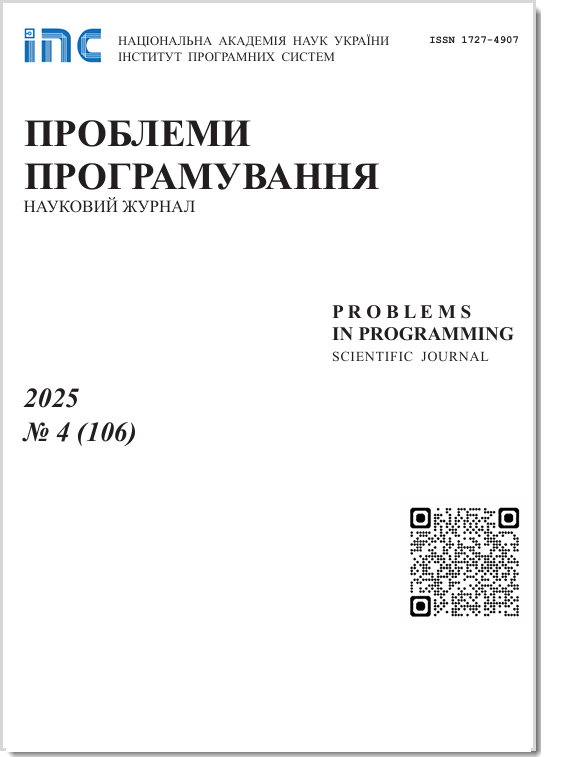Theoretical principles of use of ontologies for semantization of the Web resources
Abstract
In this paper we show the main directions of semantization of the Web information resources and their theoretical bases. We consider the semantization problems associated with the open environment information at the knowledge level. This analysis substantiates the need for the Web semantic search methods and means. Modern principle tendencies in the personified semantic deal with the ontology-based formalization of knowledge about the information needs of users and their current tasks. Our approach is based on use of the semantically marked Wiki-resources as a source of knowledge for constructing of ontologies of individual task. Each task ontology is considered as a small subset of domain ontology with large number of terms volume and high complexity. We develop the formal model of the task ontology as a special case of the formal model of domain ontology and propose methods for constructing of this task ontology on base of the set of semantically marked Wiki pages. The software implementation of the retrieval systems capable to process such task ontologies is analyzed on example of MAIPS – semantic retrieval system which provides personalized satisfaction of user information needs. Such personification is based on knowledge contained into the user task thesauri that are built on base of task ontologies.
Problems in programming 2018; 2-3: 197-203
Keywords
Full Text:
PDF (Українська)References
Baeza-Yates R., A. Raghavan R. Next generation Web search. S. Ceri and M. Brambilla, editors, Search Computing, Springer, 2010. P. 11-23.
https://doi.org/10.1007/978-3-642-12310-8_2
Rogushina J. Analysis of Automated Matching of the Semantic Wiki Resources with Elements of Domain Ontologies // International Journal of Mathematical Sciences and Computing(IJMSC). 2017. Vol. 3, N 3, P. 50-58.
https://doi.org/10.5815/ijmsc.2017.03.05
Antoniou G., Van Harmelen F. Web ontology language: Owl. In Handbook on ontologies. Springer Berlin Heidelberg. 2004. P. 67-92.
https://doi.org/10.1007/978-3-540-24750-0_4
Cyganiak R., Wood D., Lanthaler M. RDF 1. 1 Concepts and Abstract Syntax. W3C Recommendation 25 February 2014. http://www.w3.org/TR/2014/REC-rdf11-concepts-20140225/
Gruber T.R. Toward Principles for the Design of Ontologies Used for Knowledge Sharing. International Journal of Human-Computer Studies. 1995. Vol. 43. Issues 5-6. P. 907-928.
https://doi.org/10.1006/ijhc.1995.1081
Gladun A., Rogushina J., Valencia-García R., Martínez-Béjar R. Semantics-driven modelling of user preferences for information retrieval in the biomedical domain. Informatics for health and social care. 2013. Vol. 38, N 2. P. 150-170.
https://doi.org/10.3109/17538157.2012.735730
Finin T.W., Ding L., Pan R., Joshi A., Kolari P., Java A., Peng Y. Swoogle: Searching for knowledge on the Semantic Web. Proc. AAAI-2005, AAAI Press. MIT Press. 2005. P. 1682-1683.
Fazzingaa B., Lukasiewicz T. Semantic search on the Web. Semantic Web - Interoperability, Usability, Applicability. 2010. N 1. P. 1-7. https://www.researchgate.net/profile/Thomas_Lukasiewicz/ publication/220575552_Semantic_search_on_the_Web/links/0046351e94ee8994bd000000.pdf
Rogushina J.V. Semantic retrieval for Web on base of ontologies: design of models, tools and methods. Melitopol: Bogdan Hmelnitsky MDUPU. 2015. 291 p. [in Ukrainian]
Krotzsch M., Vrandecic D., Volkel M. Semantic MediaWiki. http://c.unik.no/images/6/6d/SemanticMW.pdf
Rogushina J.V. Design of distributed intelligent systems on base of ontological analysis and semantic Wiki technologies. Ontology of designing, Vol. 7, N 4(26)/2017. P. 453-472. [in Russian]
https://doi.org/10.18287/2223-9537-2017-7-4-453-472
Protégé. http:// protege. stanford.edu/
Rogushina J.V. The Use of Ontological Knowledge for Semantic Search of Complex Information Objects. Open semantic technologies for intelligent systems. 2017. P. 127-132.
DOI: https://doi.org/10.15407/pp2018.02.197
Refbacks
- There are currently no refbacks.









